Yesterday we buried our dog. Laid him to rest. Born 8th September 2001, fourteen years and three months when he died. Very old, struggling, breathing nineteen to the dozen even in his sleep, stiff in the legs and back, pain in every limb, but never a word of complaint.How I loved this dog.A restrained animal. None of this smooching up and devoted gaze business. A dog’s dog, who would come to you when he wanted affection and never otherwise. Brush against you when you were out walking, just the tips of his fur against your calf, letting you know he was there, steering you back into the group if you were straying. Great thick fur on him that he shed constantly throughout his life, that would stand up along his back when threatened. Always top dog in the dog world and yet strangely timid, as all dogs are, frightened of a stick on the path, thunderstorms, snakes, loud noises, capable of a remarkable four-legged jump backwards at a surprise encounter with some tiny animal, and yet fierce in defence of those he lived with.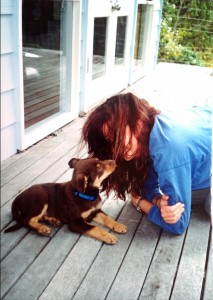 A lovely smell to him, in his fur, next to his ears. A scent like mown grass always in his paws. Teeth like mountains. Walking in his own footprints, you can see it in the photo above, leaving only a single track. Eyebrows that spoke, eyebrows that brought into question the whole human-canine history of co-existence, a dog who slept beneath your feet but woke at the sound of a single word heard in a long conversation, ears up, eyebrows arched, did you say walk?
A lovely smell to him, in his fur, next to his ears. A scent like mown grass always in his paws. Teeth like mountains. Walking in his own footprints, you can see it in the photo above, leaving only a single track. Eyebrows that spoke, eyebrows that brought into question the whole human-canine history of co-existence, a dog who slept beneath your feet but woke at the sound of a single word heard in a long conversation, ears up, eyebrows arched, did you say walk? Loved to ride in cars, for preference in the front seat, sitting up, watching what was going on. If the journey persisted he’d lie down, paws stretched over the handbrake and the gap between the seat, his head in your lap, the only sure time for genuine, unrequested affection. Grew up in a bookshop and got to be known about town. Capable of being sly when there was a chance of food, slipping out when the shop was full of customers to go and sit at the tables outside Monicas, his stomach pulled in, trying to show his ribs, his ears at full alert, watching the people eat.Never liked the lead, but would walk happily at heel for as long as you liked. The smartest thing on four legs, sired by one of Hopper’s dogs. Never trained to cows but knew instinctively how to round them up, push them along. Always conscious of his position in the pack and yet, once, when we had a frightened pup come to stay,
Loved to ride in cars, for preference in the front seat, sitting up, watching what was going on. If the journey persisted he’d lie down, paws stretched over the handbrake and the gap between the seat, his head in your lap, the only sure time for genuine, unrequested affection. Grew up in a bookshop and got to be known about town. Capable of being sly when there was a chance of food, slipping out when the shop was full of customers to go and sit at the tables outside Monicas, his stomach pulled in, trying to show his ribs, his ears at full alert, watching the people eat.Never liked the lead, but would walk happily at heel for as long as you liked. The smartest thing on four legs, sired by one of Hopper’s dogs. Never trained to cows but knew instinctively how to round them up, push them along. Always conscious of his position in the pack and yet, once, when we had a frightened pup come to stay, 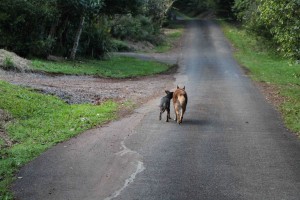 took the little thing completely under his control, showing it where to sleep, how to behave, even sharing his food, a side to him we’d never have believed possible, the two of them inseparable thereafter. The best dog. Rest in peace.
took the little thing completely under his control, showing it where to sleep, how to behave, even sharing his food, a side to him we’d never have believed possible, the two of them inseparable thereafter. The best dog. Rest in peace. ps, the featured image at the top cuts off the prints which were the point of the photo, so I'll put it in here again...
ps, the featured image at the top cuts off the prints which were the point of the photo, so I'll put it in here again...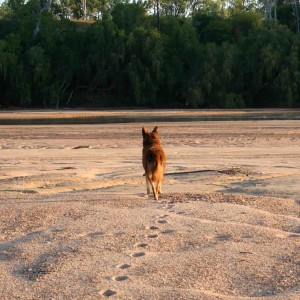
Spectre2015 Directed Sam MendesThe new Bond opens on the Day of the Dead in Mexico City, with tens of thousands of masked people in the streets, with music, drumming, elaborate floats, men in black suits with white skeletons drawn on their backs, women in flowing Latin dresses. Bond is, of course, in the middle of this, with a beautiful woman, although we only find this out - that the person we are following (who is following someone else) is Bond, and that the woman is beautiful - when they get to their hotel room and de-mask. Perhaps, we think, she thinks, they will now make love. It is not to be. In one of the finest and most understated takes in the whole film Daniel Craig climbs out of the window, walks along the very edge of the parapets of several tall buildings, the revelry continuing, vertiginously, several stories below. He’s carrying an unusual kind of automatic weapon. He moves with ease and grace. He’s not being chased or chasing, just travelling to his destination, oblivious to the danger. You don’t need to know more. Suffice to say there will be explosions, collapsing buildings, helicopters. All before the credits.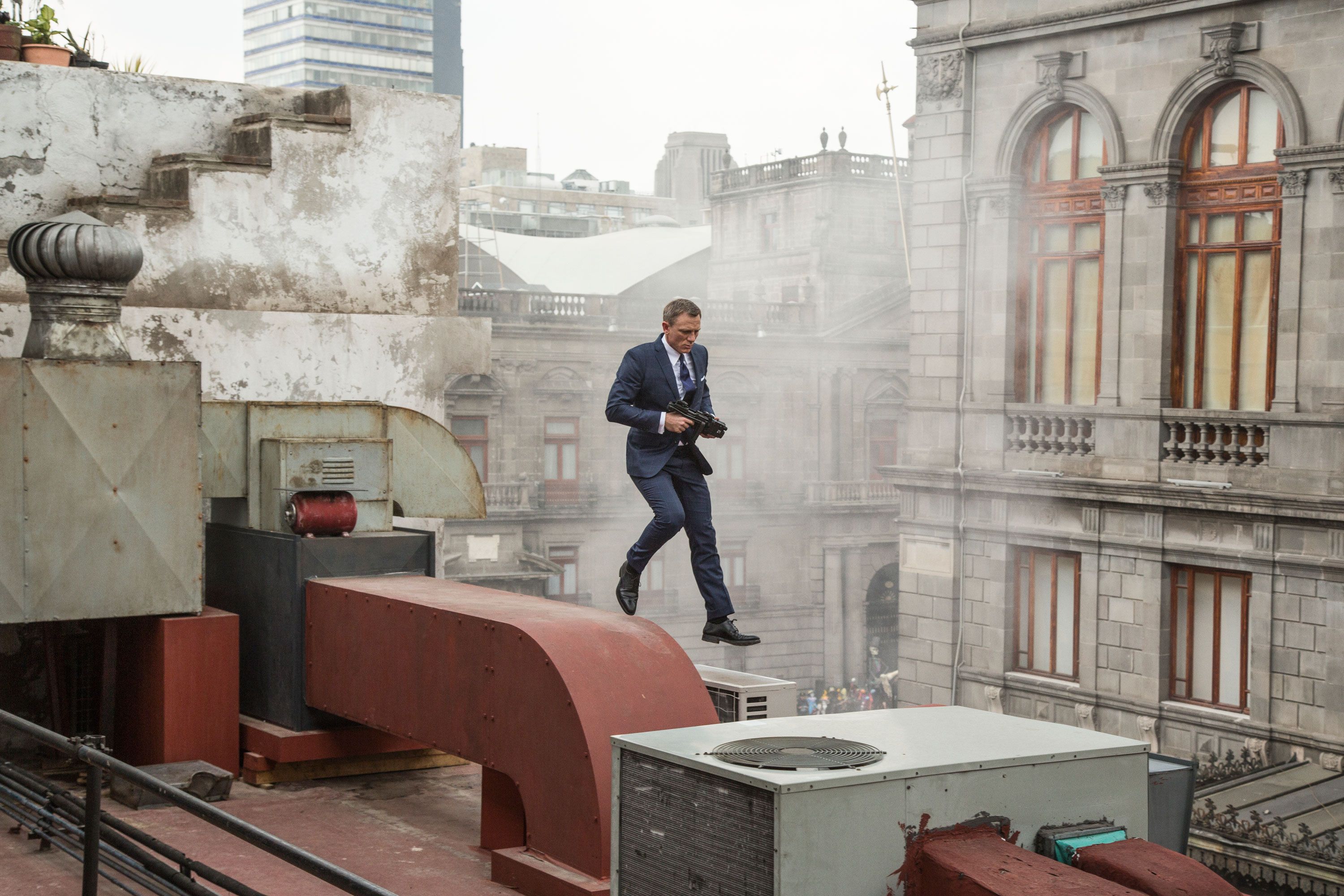 In many ways this opening sequence is the best part of the film – which is not to say that there are not some delightful set pieces, that the film is not entertaining – it’s just that, at this stage, there is no plot, the only narrative we have is Bond’s casual ease with heights, his singular poise and purpose, his actions in defence of innocent people, and this gives the scene a freedom which the rest of the film would dearly love to have, weighed down, as it is, by clumsy sub-plots, vendettas, old alliances and new loves.Let me declare my biases: I like Bond films. I particularly like Daniel Craig as Bond. When, in Skyfall – once again in an opening sequence – he boards the train, protects himself from being shot by climbing into the cabin of a front-end loader on a float car and then, miraculously, delightfully, thwarts his enemy’s ploy of disengaging the railcars by grabbing the carriage in front with the arm of the aforementioned metallic beast, ripping half its roof off in the process, when he has crawled up the arm and dropped down into the passenger car, full of tremulous innocents, he straightens up, stops for a moment. He stops to adjust his jacket and to shoot his cuffs. Only then does he leap forward to continue pursuing his enemy. That moment is, in my mind, worthy of the whole rollicking, enormous, over-priced, over-blown, worn out franchise.The problem with that film, Skyfall, and, even moreso, with Spectre, and I think I can talk about this without giving spoilers, is that the plots are asinine. Not because Bond survives where several hundred others (including the arch-enemy and a couple of beautiful women) die. That’s never really been the issue; we’re in the business here of the voluntary suspension of disbelief. The problem is that the stories have become centred around Bond himself. The evil genius who is bent on world domination, in these new iterations, is not surprised or even dismayed to find Bond at his heels, interfering with his plans. Bond is, rather, at the centre of his plans. Bond is his raison d’etre, Bond is the kernel of pain at the core of his existence. Elaborate back stories are woven to create this, adoptions, substitutions, mentorships. But this focus on him as the familial member who must be overcome on the path to world domination – as if, in fact, world domination is secondary to humiliating Bond, detracts from the enjoyment in the films in such a profound way that it is all but impossible to put disbelief aside.I don’t want to discover that Bond knew the arch-villain when they were children and one or other of them offended someone. I couldn’t give a rat’s arse to be honest. I’m not in the cinema for a psychological assessment of childhood hurt and how it has given rise to the present villain or the present Bond, I’m there to be blown away by the sheer grandiose hubris of the villain’s plans, his or her delusions of grandeur which should be, it must be said, fantastic, overblown, and slightly scary. I’m here to see Bond, against all odds, foil these plans and rescue the girl (although, it must be said, in this new film the girl has at least some agency, which is a great relief).What has happened recently in the series is that the requirement for an ‘origin story’ has overtaken the genre under the rubric of what Hemingway referred to as ‘the trauma theory of literature’. As I said a moment ago, who cares? Bond films are not literature and we don’t want this guff pasted on them in the hope of making them so. Bond is not a character we love because he was badly treated as a child. We love him because he knows how important it is to be well dressed when dropping into a train carriage, or going into a bar, a ballroom, or a battle. Cut the nonsense please, and give us some real nonsense instead.
In many ways this opening sequence is the best part of the film – which is not to say that there are not some delightful set pieces, that the film is not entertaining – it’s just that, at this stage, there is no plot, the only narrative we have is Bond’s casual ease with heights, his singular poise and purpose, his actions in defence of innocent people, and this gives the scene a freedom which the rest of the film would dearly love to have, weighed down, as it is, by clumsy sub-plots, vendettas, old alliances and new loves.Let me declare my biases: I like Bond films. I particularly like Daniel Craig as Bond. When, in Skyfall – once again in an opening sequence – he boards the train, protects himself from being shot by climbing into the cabin of a front-end loader on a float car and then, miraculously, delightfully, thwarts his enemy’s ploy of disengaging the railcars by grabbing the carriage in front with the arm of the aforementioned metallic beast, ripping half its roof off in the process, when he has crawled up the arm and dropped down into the passenger car, full of tremulous innocents, he straightens up, stops for a moment. He stops to adjust his jacket and to shoot his cuffs. Only then does he leap forward to continue pursuing his enemy. That moment is, in my mind, worthy of the whole rollicking, enormous, over-priced, over-blown, worn out franchise.The problem with that film, Skyfall, and, even moreso, with Spectre, and I think I can talk about this without giving spoilers, is that the plots are asinine. Not because Bond survives where several hundred others (including the arch-enemy and a couple of beautiful women) die. That’s never really been the issue; we’re in the business here of the voluntary suspension of disbelief. The problem is that the stories have become centred around Bond himself. The evil genius who is bent on world domination, in these new iterations, is not surprised or even dismayed to find Bond at his heels, interfering with his plans. Bond is, rather, at the centre of his plans. Bond is his raison d’etre, Bond is the kernel of pain at the core of his existence. Elaborate back stories are woven to create this, adoptions, substitutions, mentorships. But this focus on him as the familial member who must be overcome on the path to world domination – as if, in fact, world domination is secondary to humiliating Bond, detracts from the enjoyment in the films in such a profound way that it is all but impossible to put disbelief aside.I don’t want to discover that Bond knew the arch-villain when they were children and one or other of them offended someone. I couldn’t give a rat’s arse to be honest. I’m not in the cinema for a psychological assessment of childhood hurt and how it has given rise to the present villain or the present Bond, I’m there to be blown away by the sheer grandiose hubris of the villain’s plans, his or her delusions of grandeur which should be, it must be said, fantastic, overblown, and slightly scary. I’m here to see Bond, against all odds, foil these plans and rescue the girl (although, it must be said, in this new film the girl has at least some agency, which is a great relief).What has happened recently in the series is that the requirement for an ‘origin story’ has overtaken the genre under the rubric of what Hemingway referred to as ‘the trauma theory of literature’. As I said a moment ago, who cares? Bond films are not literature and we don’t want this guff pasted on them in the hope of making them so. Bond is not a character we love because he was badly treated as a child. We love him because he knows how important it is to be well dressed when dropping into a train carriage, or going into a bar, a ballroom, or a battle. Cut the nonsense please, and give us some real nonsense instead.
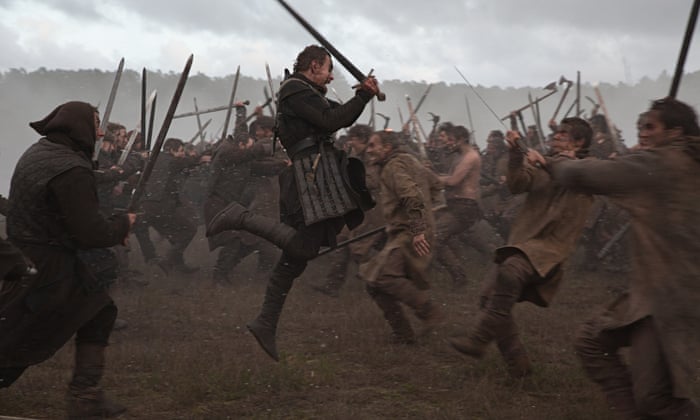
2015 Dir. Justin KurzelSo here is another egregious example of the mistreatment of Shakespeare: a dark, muddy, inarticulate, finely-crafted piece of gloomy emptiness, an abridged version of a great play delivered for a Game of Thrones audience who, if they even entered the cinema in the first place will have left more bewildered than those amongst us who are familiar with the play, which is to say something.When will film-makers (and wannabe stage directors) at last understand that language is the key to Shakespeare? That the plot is no more than the device, the scaffold, to support the language, to give it a structure within which to unravel? How many times is it necessary to spell it out: plot is not the essence of Shakespeare’s plays; it is, in fact, the least important part? These plays were intended to be acted on a bare stage. By all means, add sets; by all means film it in the north of Scotland at the end of winter, in the twilight hours when there’s still snow on the tops, when a freezing wind is coming in from all directions, when your actors are shuddering with the cold, but for fuck’s sake don’t cut the language to shreds and then mumble the paltry remaining lines in heavy accents in the hope it will provide gravitas.In this version we begin, unusually, with a dead baby, presumed to be that of the Macbeth’s, followed at once by a bloody battle on a moor in the mist which concludes with the witches prophesying to Macbeth that he will become the Thane of Cawdor and later King. A couple of scenes later we find Macbeth and his wife in a village somewhere in the Highlands, preparing for the arrival of the then king, Duncan.But stop for a moment. This village, extraordinarily, strangely, outlandishly, anachronistically, is constructed of timber in a manner remeniscent of nothing so much as banana sheds in sub-tropical Queensland. Anyone with even the briefest knowledge of Scotland can tell you the people built in stone. For the last five thousand years that we know of they built low houses with three foot thick walls of rock and rubble with thatched roofs. Nobody built thin-skinned timber houses with great cracks between the boards to let in streams of moody light. They didn’t do so because a) they had no timber and b) because if the gap under the door allowed in light it would also allow in wind and the cold.Does this matter? Am I getting side-tracked here complaining about details? Well, not really, because the film spends much of its time attempting to depict a credible medieval Scotland: no plaid and lots of mud, a harsh and pretty miserable existence made more so in the film by the lack of any means of support: no sign of black cattle, or creels, or lazy beds mulched with seaweed, in fact, the places people have apparently chosen to occupy seem to be the bleakest, most exposed areas of the hills, high up, away from bodies of water, a long way from the sea which was the main source of food… ach, away… enough, stop hoad your whisht… get on wi’ it; after all we’ve got Michael Fassbender playing Macbeth and Marion Cotillard with wonderful soulful deer eyes playing his wife … That night, Macbeth kills Duncan and blames the murder on Malcolm, Duncan’s son. Macbeth then goes to Inverness to live in a castle as King, as prophesied, but then he kills his best friend Banquo because he’s anxious that the witches also said that Banquo’s sons would sire a line of kings and he doesn’t have a child, which refers back, of course, to the death of the child at the beginning. Next thing he’s going mad, tortured by visions of Banquo’s ghost, so he’s off to see the witches again and they tell him it’s all right because he’ll be king until Burnim wood moves and anyway he can’t be killed by any man born of woman. The next thing he’s a tyrant, killing MacDuff’s family and before you know it Lady Macbeth is dead, she should have died hereafter, or, at least we should have had some explanation of why she died, then Malcolm, Duncan’s son is coming up with the English and, of course, McDuff was born by caesarean so he can kill Macbeth in a long drawn out fight scene on another misty moor.What we don’t have is any of the reasoning behind this. We have entire acts, soliloquies, sub-plots, excised for no apparent reason, but a number of new scenes added, as well as lots of the aforementioned moody lighting of hills and wooden interiors. We are left without any understanding of Macbeth’s ambition, or that of his wife and how these two weave together, we are left devoid of explanation for his madness, why it should be that these murders should haunt him when we have already been shown him killing so many men in battle. Or, if we do have some of this, it is given both as explication, in other language than Shakespeare’s, and delivered in heavy Scot’s brogue with no consideration for where the microphone’s boom might happen to have been while the person was speaking.What hubris took hold of the three screenwriters when they made the decision to rewrite this play? What witches concoction persuaded them that they could do it better than the bard? (one has, I note, a credit for the writing of Assassin’s Creed, which is, if memory serves, based on a computer game). But these questions cover an even more significant one: why would you bother? Cut, if you have to; re-fashion language for clarity, if it’s necessary, but to mangle the text in this way is worse than appalling. Fassbender is one of this era's great actors. Cotillard can be remarkable. Both of them, in this film, do their best to muddle through. Some sense of decency has persuaded the writers to leave in the tomorrow and tomorrow and tomorrow lines and Fassbender manages to deliver them with real force but by that time they are, no matter how marvellous their resonances, no more than words. We have not been given time to care about the man, to find it in ourselves to grieve for him no matter what he’s done (which is, after all, the tragedy at the heart of the thing). Indeed, before we know it we are in a long drawn out death struggle enacted with barely a word between the protagonists. In this director’s version it is the spectacle of the fight that is interesting; the way the swords are wielded, the lunge of the knife that fascinates, not the sorrow at a man being brought down so foully by ambition. The tragedy in this film becomes the fact that it was made at all.
This morning, for the first time ever while listening to the morning chorus, I did not hear a kookaburra. Normally they announce the day. I hear their cry from somewhere off in the bush so distant as to almost only be imagined, but approaching, rising up around us, calling in the light. It is only when they are done their caterwauling that the whipbirds, the lewin’s honeyeaters, the thornbills and the pigeons start their conversations. Perhaps the kookaburras were away this morning. On holiday in France or Turkey. Taken a cheap flight to Tasmania or New Zealand for a break. I hope it is so. I read, recently, that the kookaburra is in decline across eastern Australia. To be honest I didn’t read the whole article because I didn’t want to know. Habitat loss or some such thing which, I assumed, didn’t apply to me here, where I live next to the rainforest, although that wasn’t the reason I didn’t pursue the subject, it was more that I couldn’t bear the thought of a world without their call.Habitat loss was the reason that I gave over several years to creating a corridor of trees that follows the main watercourse up here on the Range where I live. I’d seen the aerial photographs of what the place had looked like from the thirties through to the seventies, when the land-clearing was at its peak, when there was hardly a stick left standing across the whole rolling expanse. At that time there were, no doubt, still forests further afield, but here, in the prime dairy country, the trees had gone; they’d been cut and milled for timber or simply burned. The stumps dug out. It seemed to me that now, when those wider forests too were cut, as the existence of a landscape in which other species than humans could survive was becoming more threatened, that it would be a good idea to try to create links between the remaining habitats, even to create new ones where old ones had been.One of the extraordinary things to me about the natural world is the way the things that live in it manage to do so. That this tree, this shrub, this grass, this lizard, bird, marsupial mouse, somehow all manage to eke out a life without the benefit of a supermarket down the road, or a social services system, without, indeed, any help from anyone else. They each and every one every day manage to scrape out a living. I understand, of course, that it is the vast complexity, the tens of thousands of beings from microbes up to mammals all living cheek by jowl, in conjunction with the weather (rain, sunshine, wind) which is, in fact, the social services network that provides the means for them to live. But it is not, it seems to me, unreasonable to notice that I could not manage what they do myself. I do not think that it is romantic of me to think like this. I think it is practical, pragmatic, essential.I want the kookaburras and their support network to continue to survive, not because they give me anything (other than the pleasure of their early morning or late evening noise) but because I think they have an intrinsic right to do so without members of my species depriving them of that ability in order to be able to have one more piece of disposable crap they didn’t even really want in the first place. I’m not sure that such a desire is really so unusual, or so primitive an ideal.What struck me as strange as I went about the business of creating that small wildlife corridor – two kilometres long by forty metres wide – accessing funding, then rights to the land, partners and co-workers to undertake the project, was the fierceness of the opposition of my fellow men and women. The extraordinary lengths they went to in order to try and stop me. The land was needed, they said, for sport, or golf, or horses. They even came up with pseudo science intended to demonstrate that the creek banks would be better off without trees, in the face of overwhelming evidence to the contrary. Their cause, their aim – as intelligent, affluent westerners who must be as aware of habitat loss as I am (residents in the same wider ecosystem) – was a mystery I have not solved yet, nor resolved within myself. In the end it all became too hard for me, the politics of it, not the planting and weeding, the fence-building and nurturing. I gave it over to others who, thankfully, kept the program going and eventually completed it.Perhaps, though, it is time to shake off my reluctance and once again consider taking up the baton. The original need remains: today, in the morning chorus of birds, I did not hear a kookaburra. I do so much hope it was an aberration.
Perhaps the kookaburras were away this morning. On holiday in France or Turkey. Taken a cheap flight to Tasmania or New Zealand for a break. I hope it is so. I read, recently, that the kookaburra is in decline across eastern Australia. To be honest I didn’t read the whole article because I didn’t want to know. Habitat loss or some such thing which, I assumed, didn’t apply to me here, where I live next to the rainforest, although that wasn’t the reason I didn’t pursue the subject, it was more that I couldn’t bear the thought of a world without their call.Habitat loss was the reason that I gave over several years to creating a corridor of trees that follows the main watercourse up here on the Range where I live. I’d seen the aerial photographs of what the place had looked like from the thirties through to the seventies, when the land-clearing was at its peak, when there was hardly a stick left standing across the whole rolling expanse. At that time there were, no doubt, still forests further afield, but here, in the prime dairy country, the trees had gone; they’d been cut and milled for timber or simply burned. The stumps dug out. It seemed to me that now, when those wider forests too were cut, as the existence of a landscape in which other species than humans could survive was becoming more threatened, that it would be a good idea to try to create links between the remaining habitats, even to create new ones where old ones had been.One of the extraordinary things to me about the natural world is the way the things that live in it manage to do so. That this tree, this shrub, this grass, this lizard, bird, marsupial mouse, somehow all manage to eke out a life without the benefit of a supermarket down the road, or a social services system, without, indeed, any help from anyone else. They each and every one every day manage to scrape out a living. I understand, of course, that it is the vast complexity, the tens of thousands of beings from microbes up to mammals all living cheek by jowl, in conjunction with the weather (rain, sunshine, wind) which is, in fact, the social services network that provides the means for them to live. But it is not, it seems to me, unreasonable to notice that I could not manage what they do myself. I do not think that it is romantic of me to think like this. I think it is practical, pragmatic, essential.I want the kookaburras and their support network to continue to survive, not because they give me anything (other than the pleasure of their early morning or late evening noise) but because I think they have an intrinsic right to do so without members of my species depriving them of that ability in order to be able to have one more piece of disposable crap they didn’t even really want in the first place. I’m not sure that such a desire is really so unusual, or so primitive an ideal.What struck me as strange as I went about the business of creating that small wildlife corridor – two kilometres long by forty metres wide – accessing funding, then rights to the land, partners and co-workers to undertake the project, was the fierceness of the opposition of my fellow men and women. The extraordinary lengths they went to in order to try and stop me. The land was needed, they said, for sport, or golf, or horses. They even came up with pseudo science intended to demonstrate that the creek banks would be better off without trees, in the face of overwhelming evidence to the contrary. Their cause, their aim – as intelligent, affluent westerners who must be as aware of habitat loss as I am (residents in the same wider ecosystem) – was a mystery I have not solved yet, nor resolved within myself. In the end it all became too hard for me, the politics of it, not the planting and weeding, the fence-building and nurturing. I gave it over to others who, thankfully, kept the program going and eventually completed it.Perhaps, though, it is time to shake off my reluctance and once again consider taking up the baton. The original need remains: today, in the morning chorus of birds, I did not hear a kookaburra. I do so much hope it was an aberration. 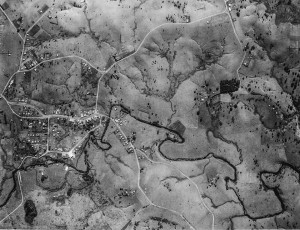
Late last year Chris and I started a small business renting our studio on the property where we live as self-contained accommodation. We did a major renovation on the place, laying a new floor, installing air-conditioning, painting it outside and in, completely refurnishing it, refining the kitchen. The idea was to make it as beautiful as possible, to provide guests with an experience they could treasure, to make a place worthy of its location.We’ve been letting it now for seven months and the response from guests has been extremely encouraging. Check out the website for more images and comments (or for availability).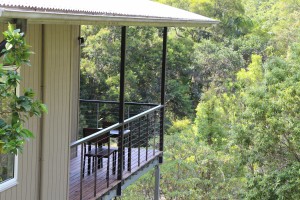
I have just finished the third instalment in John Birmingham’s Dave Hooper Trilogy: Emergence, Resistance, Ascendance. I’m reading Birmingham, of course, because I’ll be interviewing him in a couple of weeks for Outspoken. Generally we don’t want to do too many repeat authors but I’d bumped into him at the Reality Bites Festival last year in Eumundi and in response to my casual question of what he was up to he told me he was publishing not one but three (3!) books in the first half of the new year, ‘Not the sort of stuff you write, Steven, sci-fi/fantasy.’ ‘Christ,' I said, 'No orcs, I hope.’ ‘God yes, orcs,’ he replied, ‘Well, not orcs as such, but monsters from the under-realms.’ When he saw the expression on my face he launched into his speil. ‘Listen,’ he said, ‘it starts out in the Gulf of Mexico, on a rig like the Deepwater Horizon. Dave Hooper’s the security officer and he’s been on a binge, blowing his annual bonus on alcohol, sex and drugs and he’s flying back out to the rig hoping to have a few hours to sober up when they get the call there’s been an incident… monsters are boiling up from the depths. Out on the rig Dave finds himself confronted by one of these things, raging drunk on the blood of its victims, and by chance whacks it with a splitting maul, killing it and thus transferring the energy and knowledge of the beast to himself… They have, you see, drilled too deep…’Now I had a conversation with a young person the other day about this sort of thing. She said, ‘As soon as someone in a book names their sword I’m out of there.’ Which pretty much sums up my own attitude. Dave’s splitting maul, in these books, is called Lucille. Enough, you’d think, to have me running. But Birmingham brings an intelligence to this sort of guff which is both unusual and fascinating. He’s long been a weapons afficionado: it’s not uncommon to find one of his characters cradling one or other piece of hi-tech materiel, indeed on his blog Cheeseburger Gothic at one time he had a long thread asking for opinions on how to make your way across the US after civilisation had broken down, what equipment would be required… and this had given licence to a whole army of libertarians and ex-military types to spend many thousands of words listing (or arguing with each other about the relative merits of) various guns, vehicles, rocket launchers etc.. What I mean to say is that Birmingham doesn’t mind blowing things up. He doesn’t shrink from murder and mayhem, in fact he seems to to take a particular pleasure in destroying whole American cities; these are action novels in the primal sense, but they’re also scenarios to play out aspects of humanity, both social and political in unusual ways. Dave Hooper, Super Dave, is deeply flawed and being given super powers doesn’t in any way deliver him from his inner demons. Those around him, who have to try to point his new abilities in a useful direction, often refer to him as a moron, which is probably not quite fair because he’s clever enough, while lacking, perhaps, emotional intelligence. The problem being that he has to work out his issues on the world stage while fighting an ever expanding horde of monsters. (One of the more curious powers he’s gained is an extremely powerful effect on women of child-bearing status)One of the keys to writing good fiction is the ability (sometimes very difficult) to remain true to the reality you have created. What this means is no explanations given, or none outside of the course of the narrative. If there are ravenous monsters boiling up from under the ocean (and many other places besides) then that is the world the story inhabits, the author has to have complete belief in his own reality. If for a moment that wavers then the reader, too, becomes lost. Birmingham never flinches. If anything he gets better over the course of the three books – one of my complaints about some of his earlier series were that they started off remarkably, extraordinarily, well but, as the story played out, became less interesting or plausible or something – whereas in these ones the ideas and scenarios only become more fascinating and entertaining. The third book, Ascendance (which, I guess it’s some kind of spoiler, doesn’t finish the story), is a real tour de force, the first fifty thousand words are all one set piece, taking place in the space of a single night in Manhattan. Reading it I was, in the first place, unwilling to put it down, but also in a state of awe at Birmingham’s capacity to sustain the narrative in a manner that levened the mayhem with an unfolding of Dave’s understanding and his relationship to those around him, cut with wry comments on society as a whole, throwaway lines that chart the course of western civilisation in less than fifty words, or which turn the characters back on themselves and our perceptions of them.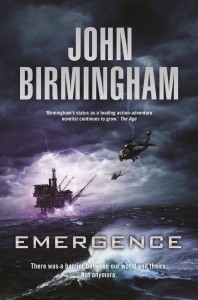 I’m not going to detail the plot or give away any more spoilers, but I will say it appears that I’ve been guilty of false advertising in my promotion of this Outspoken event by including in the blurb the statement: ‘none of this waiting a year for the sequel with our Mr Birmingham,’ because clearly there is going to be a sequel. Never mind that I can’t wait for it... I'll have to. Outspoken presents: A conversation with John Birmingham. And, introducing, Andrew McMillen, author of Talking Smack. Maleny Community Centre, July 22, 6 for 6.30pm. Tickets $18 and $12 for students, available from Maleny Bookshop 07 5494 3666 for more info visit Outspoken
I’m not going to detail the plot or give away any more spoilers, but I will say it appears that I’ve been guilty of false advertising in my promotion of this Outspoken event by including in the blurb the statement: ‘none of this waiting a year for the sequel with our Mr Birmingham,’ because clearly there is going to be a sequel. Never mind that I can’t wait for it... I'll have to. Outspoken presents: A conversation with John Birmingham. And, introducing, Andrew McMillen, author of Talking Smack. Maleny Community Centre, July 22, 6 for 6.30pm. Tickets $18 and $12 for students, available from Maleny Bookshop 07 5494 3666 for more info visit Outspoken
An interesting article in the Australian Financial Review last week on the subject of golf. The AFR is, of course, not famous for its radical take on events. Its analysis of the problems facing the sport on a local level should therefore probably be required reading for all Councillors and staff at Sunshine Coast Council – those who have recently pledged $450,000 to building a course in Maleny.The gist of the piece is that Golf is a sport in trouble: according to Golf Australia itself, the sport’s peak body, ‘50 per cent of Australia’s golf clubs are in “financial distress” and 51 per cent have 100 members or less.’Golf Australia’s own research apparently shows, ‘participation levels are down 11 per cent since 2000. That number is deceptive. Golf’s biggest age bracket is the over-65s – and among them, participation rates have held steady. The downturn is due to steep falls in participation at all age levels below that bracket... rates in the crucial 15-to-24 age bracket have dropped from almost 6 per cent to less than 2 per cent. This missing junior generation will eventually become a missing middle-aged generation.’ (my emphasis)The article goes on to list some of the problems with Golf and the way it is played – the rigid conservatism of some of the clubs (men not being allowed to wear ankle socks, no mobile phones on the course or in the clubroom), but one of the more interesting findings is that people don’t have the time to play eighteen holes. Nine hole golf courses are, it seems, the way to go.Now I’m not a disinterested observer here. I was, along with 73% of this community*, strongly opposed to the building of a golf course on Council land adjacent to Maleny township. Land that could be used for much better public purposes. Council, however, have been resolute in their support, even in the face of a business case they regarded (at the time of awarding funds) as inadequate.When statistics such as these are publicly available surely there is a responsibility on those disposing of rate payers funds to consider the wisdom of pursuing an eighteen hole course on this land? Shouldn’t they at least be considering limiting the size to nine holes? The full article can be read here.*Caloundra City Council survey 2007
The London Review of Books has published what Alan Bennett describes as a 'sermon before the University, Kings College, Cambridge'. It's available here both in text form and as a podcast. His point is quite plain, even if he takes a somewhat rambling and entertaining journey to get to it. 'My objection to private education,' he says, 'is simply put. It is not fair.'He's writing about Britain, of course, and so he's also talking about deeply ingrained traditions of class and privilege, but what he says of that country could equally be said of education in Australia. He continues: '... to say that nothing is fair is not an answer. Governments, even this one, exist to make the nation’s circumstances more fair, but no government, whatever its complexion, has dared to tackle private education … I am not altogether sure why … [one] reason why there is a lack of will and a reluctance to meddle – a reluctance, one has to say, that does not protect the state sector, where scarcely a week passes without some new initiative being announced – is that private education is seemingly not to be touched. This I think is because the division between state and private education is now taken for granted. Which doesn’t mean that it is thought to be fair, only that there is nothing that can or should be done about it.But if, unlike the Daily Mail, one believes that the nation is still generous, magnanimous and above all fair it is hard not to think that we all know that to educate not according to ability but according to the social situation of the parents is both wrong and a waste. Private education is not fair. Those who provide it know it. Those who pay for it know it. Those who have to sacrifice in order to purchase it know it. And those who receive it know it, or should. And if their education ends without it dawning on them then that education has been wasted.'Exactly. But this is the point. For unexplained reasons we keep harping on the idea that a private school education has advantages over a public one. Be it smaller class sizes, better teachers, more resources, or possibly the social network which is, literally, bought into, which pays off throughout life. But an education is something much more complicated than any of these things. When I was at a British boarding school in the 1960s, one of the elite schools of Scotland, they kept telling us that the subject matter we were studying, be it Latin, History, English, Maths, Biology, Physics, while important, was not the essential thing; that what they were trying to instil in us was a way of thinking, of looking at the world and being able to question it in an intelligent way.That's as maybe, except that this ability to question also came with its own severe restrictions. Not only did our teaching, as Mr Bennett says above, fail to awaken in us the idea that a privileged education ‘based not according to ability but according to the social situation of the parents is both wrong and a waste,’ it almost demanded we believe the opposite of that, while at the same time imposing structures of thought which led those of us unfortunate enough to be subject to their ministrations to conclude through the very way that they made us live and taught us that it was more than okay to live a life without love; that, amongst other travesties, women belonged firmly to the second sex and that to express support for any of their concerns was to show weakness.If the western world has found itself in trouble over the last few decades it is, primarily, because it has insisted on taking its leaders from this stock, believing them suited to the task of ruling despite having been ruthlessly cut off from their feelings as small children. An education which does not include an understanding of what it means to be human is not an education. Alan Bennett is, of course, primarily a playwright. Just last week, however, I had the opportunity to rewatch a copy of his wonderful film, 'The History Boys,' starring the extraordinary and now late-lamented Richard Griffiths. A film so rich in both anecdote and in its own delight in language and learning (and their eventual incapacity to ever really help us to understand what we're doing here), that I wanted to start watching it again as soon as it finished. Treat yourself to the article or the podcast; here is someone with the capacity to say what needs to be said in words that are hard to argue with.
Alan Bennett is, of course, primarily a playwright. Just last week, however, I had the opportunity to rewatch a copy of his wonderful film, 'The History Boys,' starring the extraordinary and now late-lamented Richard Griffiths. A film so rich in both anecdote and in its own delight in language and learning (and their eventual incapacity to ever really help us to understand what we're doing here), that I wanted to start watching it again as soon as it finished. Treat yourself to the article or the podcast; here is someone with the capacity to say what needs to be said in words that are hard to argue with.
In the most recent issue of Rolling Stone Magazine there is a long and profoundly fascinating article by Al Gore on the climate situation entitled The Turning Point, New Hope for the Climate. It is a polemic which is full of both hope and despair, with the former, well it would be wrong to say triumphing, but at least winning out over the latter.He starts by describing the incredible advances in renewable technology, in particular solar, and what that means, how it is manifesting in different parts of the world, going on to list some of the forces ranged against its deployment. For the centre part of the piece he inevitably outlines the damage that is being done and will be done by changing weather patterns, but towards the end he takes time to point out the failure of 'democratic capitalism' to address the problem, before finally coming back to a call to action, bolstered by hope. As he says in the last paragraph, quoting Martin Luther King, 'The arc of the moral universe is long but it tilts towards justice.'This piece ties in well with another by the inimitable Bill McKibben in the New York Review of Books on the book Walden Warming: Climate Change Comes to Thoreau's Woods by Richard B Primack.It seems that Henry David Thoreau was not only the author of one 'of the greatest books any American has ever produced', he was also a formidable naturalist, spending a minimum of four hours a day walking in and around Concord, taking notes. Those painstaking observations of the timing of such natural events as the budding of flowers in spring are being used to measure the behaviour of the same plants 160 years later. The results are, generally, not good. As McKibben points out, the Sierra Club has recently ended its 120 year prohibition against engaging in illegal protest, explaining that the ongoing climate emergency required more intense engagement than they'd had so far.What these articles seem to me to suggest, and it might be that I'm just an optimist, is that, at least in other countries, some sort of tipping point has been reached in the so-called debate about Climate Change; that the effects we have already seen are dramatic enough to at last begin to exercise the minds of politicians. That Australia, with a government which is no more than the political wing of the Murdoch Press and the fossil-fuel industry, is going the other way, is a matter of deep shame and concern.